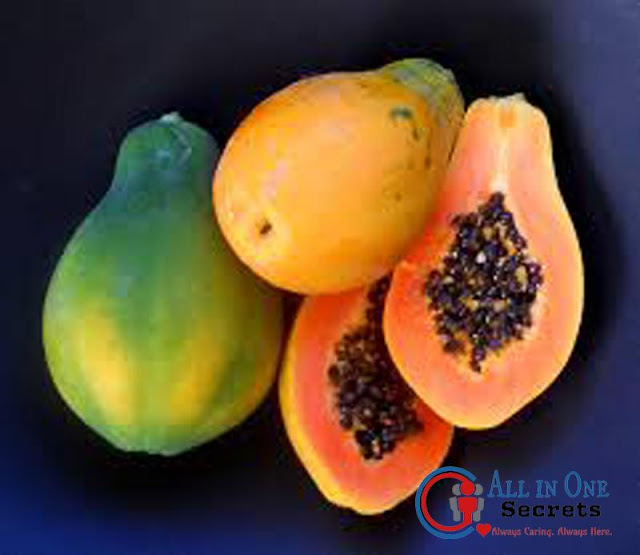History at a glance
The Hawaiian papaya fruit is a fruit that is available in many North American supermarkets; Look for organically grown fruits, as most Hawaiian papayas are genetically engineered.
The Health Benefits of Papaya range from cancer prevention, pain relief, and cardiovascular disease prevention, to possibly even hypoglycemic effects in diabetics
This versatile and delicious fruit can be used for breakfast to dinner, in salads and desserts.
Formerly believed to be native to southern Mexico and Central America, papayas are now found in every tropical and subtropical country.
Although they require demanding climatic conditions for growth and fruit production, they are good plants for flower tubs when the humidity and temperature levels can be controlled.
The plant is short-lived, fast-growing and reaches in the first year between 3 and 3.5 meters in height.
Although papaya plants look like trees, they are actually large herbs with hollow green or deep purple stems that are thicker at the base.
Successful commercial production is mainly in Hawaii, tropical parts of Africa, the Philippines, India, and Australia.
There are two different types of papaya, the Hawaiian and the Mexican papaya. The most commonly found species in the supermarket is the Hawaiian variety.
This is probably because the Hawaiian plants are shorter and the fruit a bit lighter, making them easier to harvest.
The Mexican papaya fruit can weigh up to 10 pounds (about 5 KG) and be 15 inches long. The fruits and seeds are edible.
The papaya is juicy, sweet and tastes a bit like cantaloupe melons, while the seeds have a spicy taste reminiscent of black pepper.
If you grow papayas at home, the plants should be changed every four years to continue harvesting sweet fruits.
Most Hawaiian papayas, as well as papaya, is grown in China, are genetically engineered (GE), so it's important to only buy organic papaya, so avoid genetically modified organisms (GMOs).
The Power of Papaya
The papaya is a packaged fruit with more health benefits than you could imagine. However, fruits sprayed with insecticides and fungicides can cause more health problems than can outweigh potential benefits.
Choose papayas carefully to see if they have been organically grown to reduce the negative impact on your health.
Health Benefits of Papaya
1. Vitamins C and A
The fruit also has 31 percent of the recommended daily amount of vitamin A, which is important in the regulation of gene expression, prenatal and postnatal development and red blood cell production, and helps to prevent skin, breast, liver and prostate cancer.
2. Reduces Arthritis Pain
The presence of papain and chymopapain in papaya is partly responsible for the anti-inflammatory effects of the fruits. The reduction of inflammation reduces pain in the joints.
In addition, a research study in the journal "Annals of Rheumatic Diseases" examined findings that link low vitamin C levels to a higher risk of developing arthritis.
Rich in vitamin C and papain, papaya plays a role in the prevention and reduction of arthritis pain and inflammation.
3. Reduces Menstrual Pain
Papain can also help reduce the pain of cramps and regulate flow during a woman's menstrual cycle.
4. Can reduce Cardiovascular Disease
Papaya is one of the richest sources of folic acid you can buy in the grocery store. Folic acid is important in reducing homocysteine levels in the body.
Homocysteine is an amino acid associated with an increased risk of cardiovascular disease. In addition, folic acid is also important in preventing neural tube defects in babies.
5. Helps to Prevent DNA Damage
Papaya is packed with antioxidants that prevent damage to your cell's DNA. This is one of the ways in which papaya can help prevent certain cancers and reduce the appearance of skin aging.
6. Lowers Blood Sugar in People with Diabetes
The fermented papaya fruit can lower blood sugar in people with diabetes. However, before you add papaya to your daily diet, consult your doctor to keep a close eye on your blood sugar levels to prevent accidental hypoglycemia or low blood sugar.
Also, remember that this effect occurs with fermented papayas. If you suffer from diabetes, you should only enjoy fresh papaya in moderation because it is relatively high in fructose.
7. Can help Prevent Macular Degeneration
Papaya is rich in vitamin A, which is very important in the prevention of macular degeneration and other eye diseases.
8. Antioxidant Effects on Alzheimer's Disease
If too many of them are produced, for example, because of the types of food you eat, they create a state of oxidative stress in your body. Free radicals in the brain can be an important factor in the development of Alzheimer's.
In one study, people who had been eating fermented papaya for six months had a 40 percent reduction in a DNA oxidative stress marker, increased aging, and the development of cancer.
9. Prostate Cancer
The antioxidant and high vitamin content of papaya play an important role in the prevention of certain cancers. One study found that the combination of green tea and lycopene had an effect in the prevention of prostate cancer. Papaya is rich in lycopene.
10. Improved Digestion
Papain is a digestive enzyme that helps in the breakdown of proteins. People who live in the tropics have long used papaya to help with the treatment of constipation and irritable bowel syndrome. The fruit is easy to digest and the high fiber content can improve your intestinal health.
11. Seeds and Pulp have Anti-Cancer Properties
Although the fruit is delicious, the pulp and seeds are also edible. A study has shown that the activity of benzyl glucosinolate (BG) compounds found in the seeds and pulp has anti-cancer properties.














No comments:
Post a Comment